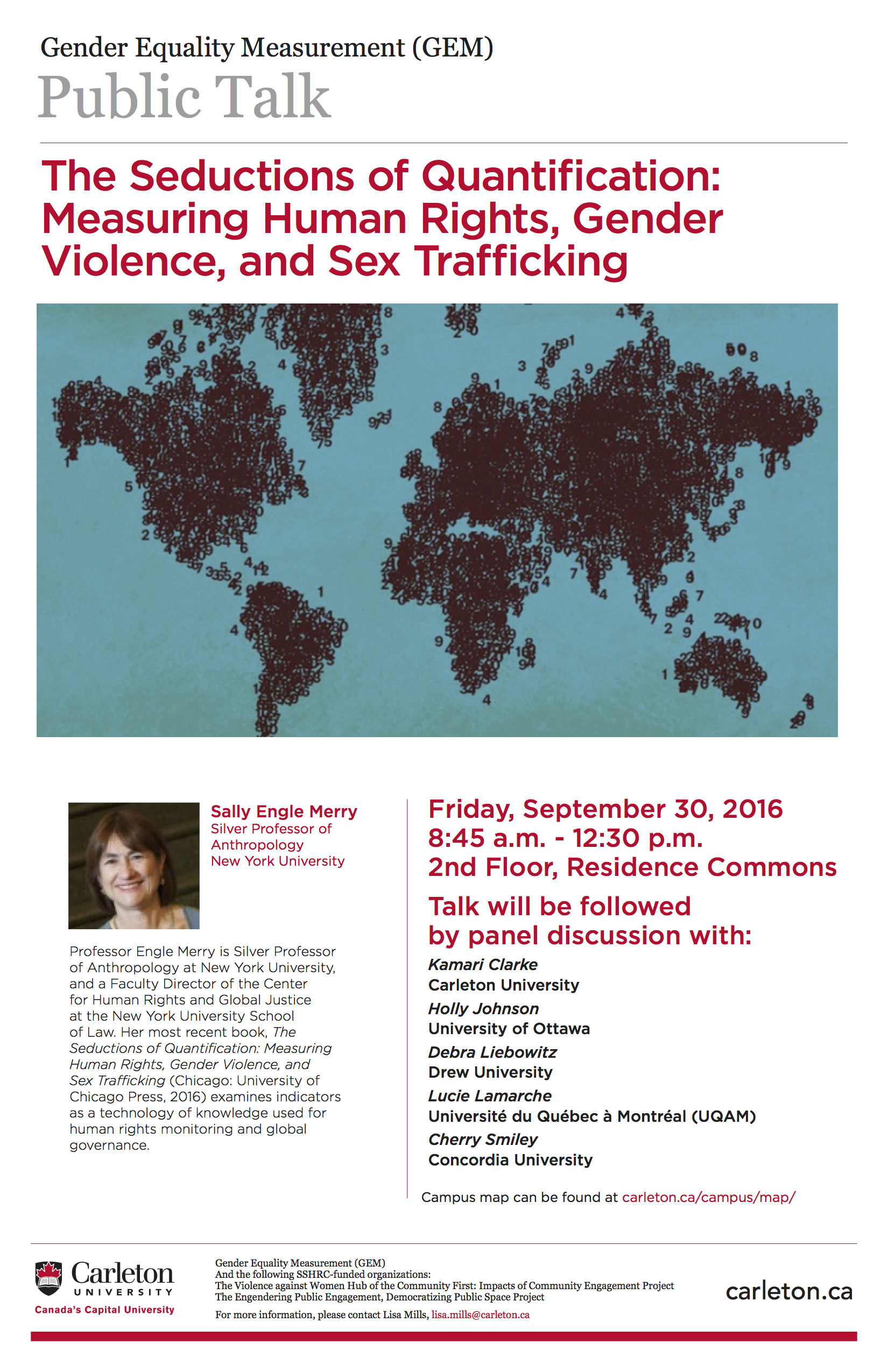Measuring the Right to Live Free from Violence
The Gender Equality Measure group at Carleton University organized a one-day symposium on September 30, 2016 on women’s human rights and measurement as part of the Engendering Public Engagement project.
Description of GEM
Gender Equality Measurement (GEM) is a multi-disciplinary cluster of academics at Carleton University, designed to explore and act as a knowledge hub on the ‘measurement turn’ in public policy.
The rise of gender equality measurement, and the certainty with which equality is assumed to be quantifiable, raises complex questions about epistemology, political change, policy innovation, and feminist research. Some of the questions raised by gender equality measurement and on which further research and coordination is needed include: What is the relationship between the categories and tools of measurement used to track gender equality and the types (and limits) of knowledge produced? How and why have particular gender equality measurement tools and concepts evolved? How does measurement, and the tools of measurement produce certain kinds of experts and who are seen as experts? Under what conditions have current measurement efforts furthered, or undermined gender equality goals?
GEM aims to foster research on these issues at the same time as facilitate connections between and across the various institutional and disciplinary silos within which measurement practices are unfolding. Working in the fields of Canadian Studies, Law and Legal Studies, Political Science, Public Policy and Administration, the members of GEM are:
- Doris E. Buss, Department of Law and Legal Studies
- Christina Gabriel, Department of Political Science
- Diana Majury, Department of Law and Legal Studies
- Lisa Mills, School of Public Policy and Administration
- Pauline Rankin, Interim Associate VP (Research and International), School of Indigenous and Canadian Studies.
The exercise
The GEM public engagement exercise consisted of a public address by a leading expert on the use of quantitative measures and violence against women followed by a response panel of academic experts and an afternoon roundtable dialogue featuring human rights advocates who engaged with issues raised in the morning session as well as in a background paper distributed in advance.
The purpose of the event was to engage academics, community-based human rights advocates and government officials in an exchange of perspective on the contentious topic of the uses and abuses of quantitative measures in addressing women’s right to live free from violence.
The morning session

The morning session featured a public talk in the morning by Professor Sally Engle Merry of New York University, an expert on human rights and measurement. Her talk focused on her most recent book, The Seductions of Quantification: Measuring Human Rights, Gender Violence and Sex Trafficking (Chicago University Press, 2016). The video of Professor Merry’s talk is available here.
The second half of the morning centred on a roundtable panel composed of the following university-based experts: Kamari Maxine Clarke (Professor of Global and International Studies at Carleton University); Debra J. Liebowitz (Professor of International Relations and Women’s and Gender Studies at Drew University, Madison, New Jersey, USA; Holly Johnson, Associate Professor of Criminology, University of Ottawa; Lucie Lamarche, Professor, Faculty of Political Science and Law, Université du Québec à Montréal, and Cherry Smiley, PhD Candidate, Concordia University.
Afternoon dialogue
The afternoon workshop focused on measurement in relation to violence against women and the dilemmas it presents. In order to facilitate a deeper and more focused discussion, the workshop was by invitation. Professor Merry led off the afternoon, followed by a roundtable discussion by a panel of VAW/human rights activists. The panelists were Bonnie Brayton, National Executive Director, DAWN Canada; Sunny Marriner, Ottawa Rape Crisis Centre; Anuradha Dugal, Canadian Women’s Foundation; Jamie Chai Yun Liew, Faculty of Law, Ottawa University, Kate McInturff, Canadian Centre for Policy Alternatives.
The workshop was designed to provide an update on current modes of measurement and concerns with them so that participants are better equipped to assess and critique data that they are presented with and to think about what kinds of data they might want to solicit.